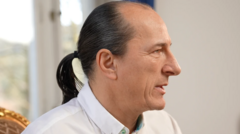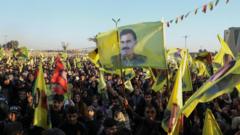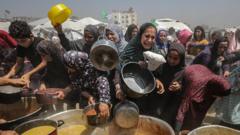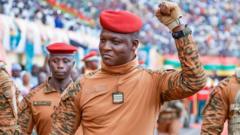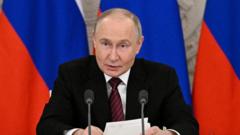In an interview with the BBC, Burundi's President Évariste Ndayishimiye has accused Rwanda of planning an attack, linking the speculation to historical coup attempts and current conflicts in the DRC. Rwanda has dismissed these claims while both countries call for dialogue.
**Rwanda Accused of Planning Attack on Burundi Amid Rising Tensions**
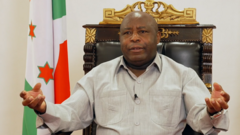
**Rwanda Accused of Planning Attack on Burundi Amid Rising Tensions**
Burundi's President Ndayishimiye claims credible intelligence of a possible Rwandan attack, sparking regional security concerns.
In an exclusive BBC interview, President Évariste Ndayishimiye of Burundi expressed serious concerns over Rwanda's intentions towards his country, suggesting that Kigali is planning a military attack. Citing "credible intelligence," Ndayishimiye characterized Rwanda's actions as reminiscent of past coup attempts, particularly one he alleges happened nearly a decade ago.
Rwanda, in response, has called these assertions "surprising," maintaining that the two countries are cooperating on security matters along their long-closed shared border. The rising tensions are further complicated by Rwanda's controversial involvement in the Democratic Republic of Congo (DRC), where the M23 rebel group has been gaining ground, with some international observers claiming Rwanda provides support to these factions.
Ndayishimiye accused Rwanda of backing armed groups like the Red Tabara, which he views as proxies aimed at sowing discord within Burundi. "They [Rwanda] would say it's an internal problem when it's Rwanda [who is] the problem,” he stated, underscoring Burundi's refusal to allow foreign aggression without resistance—a sentiment he amplified by declaring that Burundians "are fighters."
Despite the palpable tension, Ndayishimiye emphasized his desire for dialogue over conflict, reaffirming his commitment to peace, provided that his country remains unprovoked. He voiced a desire for the full realization of prior peace agreements with Rwanda, emphasizing that peace is preferable to war.
He lamented that past agreements have not been honored and accused Rwanda of complicity in orchestrating the 2015 coup attempt by recruiting and training youth in refugee camps. This historical context underlines the fragile nature of the relationship between the two nations.
In his interview, Ndayishimiye also touched upon the broader regional instability stemming from the ongoing conflict in the DRC, attributing it to external forces that capitalize on the country’s rich mineral resources. He called for a collaborative dialogue that includes opposition parties and armed groups to forge a lasting peace.
Highlighting the plight of refugees amidst the unrest, Ndayishimiye remarked that while some Congolese have risked dangerous journeys across the Rusizi river to flee their war-torn home, Rwanda must ensure that border security is prioritized amid ongoing military involvement in the DRC.
On international support, he contended that it could be strengthened to effectively engage with the armed groups hindering peace. As regional dynamics evolve, the outlook for both Burundi and Rwanda remains uncertain, with calls for accountability and peace echoing from both sides.


